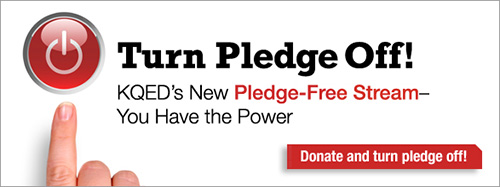
When ex-NPR chief Vivian Schiller came to town the other day, she bragged: “Public media has the most successful paywall out there. It just happens to be voluntary.” She warned stations, however, they must innovate or perish.
KQED San Francisco, America’s largest public radio station by audience size, can’t be accused of resting on its laurels. The station is rolling out its trusty spring pledge drive next month, but this year, KQED is trying to give people a satisfactory answer to an age-old question: I already gave you money, so why do I have to keep listening to this infernal pledge drive?
For a donation of $45, listeners can opt to turn down the tote bag and get a premium premium: a members-only Internet audio stream with no fundraising whatsoever. Paying listeners will hear uninterrupted local and national programming — the programming otherwise covered up by pledge breaks on the FM signal.
“In this beta — it will always be in beta to some extent — we’re just looking for: Is there really a market for it? And how do we have it priced?” said Don Derheim, KQED’s chief operating officer and executive vice president.
Pledge drives, annoying as they might be, are the bread and butter of public radio. They aren’t going away. But Derheim said it appears listeners are willing to “pay their way around it.” He said about 100 people had signed up as of Thursday morning, when the offer first went live. Since then, the station has raised $26,000 in response to promotions for the pledge-free stream. KQED has 205,000 individual donors, whose contributions make up more than half of the station’s annual revenue.
After donating, every listener gets a unique code tied to an email address. That code unlocks access to the alternate stream on KQED’s website on up to four devices. The pledge-free stream is a one-time gift — more like a mug than a subscription. Derheim said he expects to offer the pledge-free stream again during the station’s next drive, in September, and listeners will have to donate again to get access.
KQED’s digital media team developed and beta-tested the technology with volunteers two years ago. The tech worked, Derheim said, but the world wasn’t ready for it — with smartphones in so many listeners’ hands (and cars), now is the time: “The device universe is ready. The listeners here are ready.” KQED also was among the first stations, a year ago, to take small donations via text message.
“We’re lucky enough to be here in the ever-expanding definition of Silicon Valley. We’re getting out there with our products and ideas and taking them to our customers,” Derheim said.
I spoke with the public radio pledge drive’s original inventor, the longtime NPR correspondent Susan Stamberg. She loved the idea: “I think it’s a clever and realistic solution,” she said.
Back in the 1960s, Stamberg was general manager of American University’s fledgling public broadcaster, WAMU. “I didn’t have a clue, but I did know that we needed money and that we weren’t going to get any from the university,” she said. She fought with AU’s vice president for the right to raise money. She hand-stamped envelopes to 200 listeners, soliciting contributions in any amount.
“They were small, modest checks but from loyal, loyal listeners,” she said. “I kept watching for those checks to come in…and realized the amount of money we were collecting would not cover the cost of sending out letters.” Then, a miracle: An anonymous donor wrote a check for $1,000. That’s when Stamberg (and her university bosses) realized people would be willing to pay for news on the radio. The pledge drive stuck, although it would be awhile until someone (she doesn’t know who) would get the idea to put it on air.
This week, when word of KQED’s idea got out, an intense debate emerged within the industry. My former colleague at Boston’s WBUR, reporter Adam Ragusea, said the whole idea rubs him the wrong way: He’s worried because he thinks it’ll work.
“The incentive for the stations will be to gradually make the exclusive service more and more desirable than the free service, and the pledge periods longer and longer in order to get more people to buy in,” Ragusea said. “Then little by little, year by year, we will become a de facto subscription service, which is not what we’re supposed to be.” He takes issue with the concept of offering “premium” content only to paying members, saying it departs from public radio’s core mission of public service.
I put that argument to Stamberg. [See update below.] “That’s a very sophisticated argument,” she said. “But you know, I don’t think it’s an argument for the 21st century…The realities shift and change. I think we have to recognize it. We’re not putting commercials on the radio. We’re staying true to what our mission is.”
Derheim, at KQED, says public radio needs to have a good philosophical think about all this. But he said KQED can’t sit around and wait for that conversation to happen. He listened to the audio of Schiller’s talk at Harvard this week, and he said he identified with her aggressively future-focused attitude.
“[We] must be the disruptor,” he said, using Schiller’s word. “We’re trying to thrive on being there first, on what’s going to work next.”
[Update, 4/25/11: An earlier version of this story mistakenly referred to Susan Stamberg as “Mama” Stamberg. The nickname, in fact, belongs to her mother-in-law. Every year on NPR, around Thanksgiving, Stamberg shares “Mama Stamberg’s cranberry relish recipe,” a recipe from the mother of her late husband, Louis C. Stamberg.]